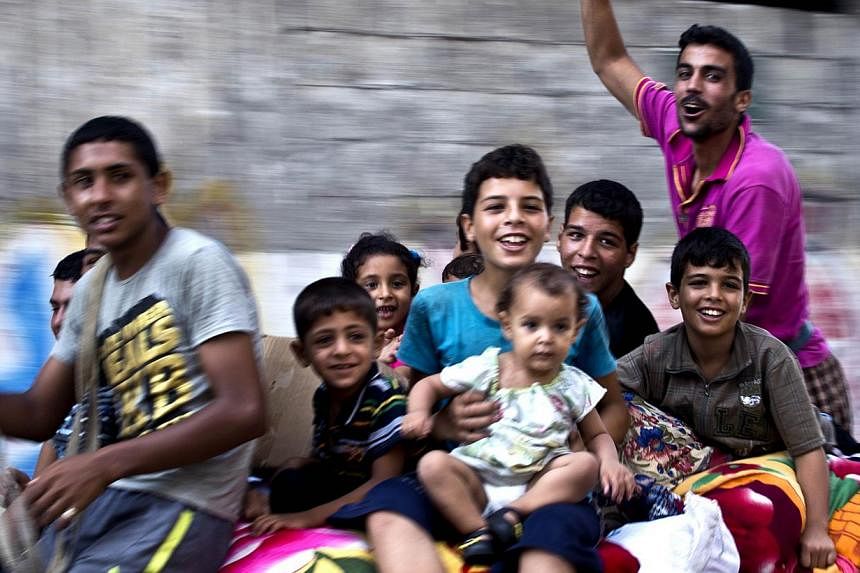GAZA CITY, Palestinian Territories (AFP) - The skies over Gaza remained calm Wednesday as a long-term ceasefire took hold, ending the deadliest violence in a decade with Israel and Hamas both claiming 'victory' in the 50-day war.
Millions in and around the war-torn enclave enjoyed a welcome night of peace during which there were no strikes on Gaza, nor Palestinian rockets fired at Israel, the Israeli army said.
"Since the truce came into force, there has been no IDF activity in Gaza, and no rocket fire on Israel," a military spokeswoman said 12 hours after the guns on both sides fell silent.
The agreement, which went into force at 1600 GMT (midnight Wednesday Singapore time) on Tuesday, was hailed by Washington as well as by UN Secretary General Ban Ki Moon, who said he hoped it would set the stage for a resumption of Israeli-Palestinian peace talks.
Both Israel and the Islamist Hamas movement, the de facto authority in Gaza, hailed the ceasefire as a victory.
But commentators took a more realistic perspective. "A draw" was the headline in Maariv newspaper.
And experts said the two sides had agreed to halt their fire out of exhaustion after seven weeks of fighting which has claimed the lives of 2,143 Palestinians and 70 on the Israeli side.
"After 50 days of fighting, the two sides were exhausted so that's why they reached a ceasefire," Middle East expert Eyal Zisser told AFP.
Politically, Hamas had "not achieved anything" but in order to really weaken the movement, Israel would have to resume peace talks with the Western-backed Palestinian Authority.
The Palestinians said it was a "permanent" truce, while a senior Israeli official described it as "unconditional and unlimited in time".
Under the deal, Israel will ease restrictions on the entry of goods, humanitarian aid and construction materials into Gaza and will expand the area open to Palestinian fishermen to six nautical miles.
But talks on crunch issues such as Hamas's demands for a port and an airport and the release of prisoners, as well as Israel's calls to disarm militant groups, will be delayed until the negotiators return to Cairo within the coming month.
In Gaza, where celebrations erupted once the truce took hold, the festivities continued late into the night as its 1.8 million residents revelled in the end of seven weeks of bloody violence.
"We slept last night without any raids and we couldn't hear warplanes," said a resident Mutaz Shalah as he headed to work for the first time since the war began on July 8.
"We were able to sleep," said another resident, Mr Alaa al-Jaro. "We had the best sleep ever after the Israeli aggression ended."
Although there was little sign of celebration in Israel, as people absorbed the deaths of two civilians killed by a mortar shell just before the truce, officials were quick to portray the agreement as a resounding success.
"For years Hamas has prepared a number of very big operations for a war against Israel, involving rockets, involving tunnels and terror attacks and all of these met a crushing response from the IDF," Mr Liran Dan, spokesman for Prime Minister Benjamin Netanyahu, told army radio.
"Hamas started this (war) with a clear declaration that it wouldn't stop without an end to the blockade, a port and an airport... It set out with a very clear objective and didn't get anything that it wanted." But Hamas said it had caused Israel heavy losses and emerged victorious.
"The Palestinian resistance achieved a military victory before the war was over because it stood firm in the fact of the arsenal of Zionist terrorism," a statement said.
In Gaza itself, life was beginning to return to normal, with workers from the electricity company out early to repair two main lines to Israel which were damaged in the fighting, while phone company technicians worked to repair damaged infrastructure.
Shortly before dawn, Gaza's fishermen began pushing out to sea as Israel expanded the fishing zone to six nautical miles.
One of the main clauses of Tuesday's agreement was opening the crossings to allow in goods, humanitarian aid, medical supplies and materials to repair the water, electricity and mobile phone networks.
But it was not immediately clear when the changes would go into effect.
The Palestinian liaison official said the restrictions at the Erez crossing in the north and Kerem Shalom commercial crossing in the south had returned to what they were before the crisis, but he said it was unclear what the new regulations would involve.
"We will have a meeting today with Israel to discuss the new procedures but the only thing in place so far is the new fishing limit while crossings have returned to the status quo ante," he told AFP.

